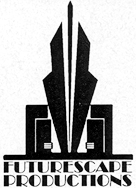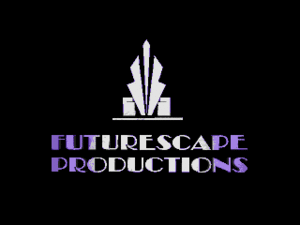Difference between revisions of "Futurescape Productions"
From Sega Retro
(article creation) |
m |
||
| (21 intermediate revisions by 2 users not shown) | |||
| Line 1: | Line 1: | ||
{{CompanyBob | {{CompanyBob | ||
| − | | logo= | + | | logo=FutureScapeProductions logo.png |
| − | |||
| founded=1992-10-01{{ref|http://web.archive.org/web/20210509222319/https://opencorporates.com/companies/us_ca/C1825862}} | | founded=1992-10-01{{ref|http://web.archive.org/web/20210509222319/https://opencorporates.com/companies/us_ca/C1825862}} | ||
| − | | defunct= | + | | defunct=1994-08{{ref|https://www.linkedin.com/in/klhurley/details/experience/}}{{ref|https://www.linkedin.com/in/kmcgrath/}} |
| − | | | + | | headquarters=[[wikipedia:San Mateo, California|3130 La Selva Drive, #104, San Mateo, California 94403, United States]]{{ref|http://web.archive.org/web/20210509222319/https://opencorporates.com/companies/us_ca/C1825862}}{{ref|https://web.archive.org/web/20210509222952/http://www.drawrick.com/videogamegraphics2D3D.html}} |
| − | | | + | }}{{stub}}'''{{PAGENAME}}''' was an American video game development studio most known for providing software for dedicated peripherals, such as the [[Sega VR]] game ''[[Nuclear Rush]]'' and the [[Menacer]] game ''[[Monster Hunter]]''. Founded in October 1992 by two former [[Electronic Arts]] programmers and based in [[wikipedia:San Mateo, California|San Mateo, California]], it exclusively developed games for [[Sega of America]], and served as one of the company's dedicated hardware developers. Unfortunately, a number of complications both within Futurescape and the larger game industry resulted in the studio's closure in August 1994{{ref|https://www.linkedin.com/in/klhurley/details/experience/}}{{ref|https://www.linkedin.com/in/kmcgrath/}}, leaving nearly half a dozen [[Sega]] games entirely unreleased. |
| − | + | ||
| − | | headquarters=[[wikipedia:San Mateo, California|San Mateo, California, United States]]{{ref|http://web.archive.org/web/20210509222319/https://opencorporates.com/companies/us_ca/C1825862}} | + | ==Company== |
| − | }}{{ | + | [[File:FuturescapeProductions logo B.gif|thumb|right]] |
| + | Co-founded by former [[Electronic Arts]] programmer [[Kenneth Hurley]] and technical director [[Kevin McGrath]]{{ref|https://www.linkedin.com/in/kmcgrath/details/experience/}} in October 1992{{ref|http://web.archive.org/web/20210509222319/https://opencorporates.com/companies/us_ca/C1825862}}, Futurescape Productions served as a third-party game developer for publishers such as [[Sega]], [[Electronic Arts]], [[Crystal Dynamics]]{{ref|https://web.archive.org/web/20210509222952/http://www.drawrick.com/videogamegraphics2D3D.html}}, and [[Accolade]]. The company consisted of about 9 people, including four artists, three programmers, one business manager, and a CEO{{ref|https://www.linkedin.com/in/klhurley/details/experience/}}, with up to four additional contracted employees.{{ref|https://www.linkedin.com/in/kmcgrath/details/experience/}} According to Hurley, his (and likely most of Futurescape's games) were coded in [[wikipedia:C (programming language)|C]], [[wikipedia:C++|C++]], and [[wikipedia:Assembly language|assembly language]]. Importantly, the company was located just a few minutes' drive from [[Sega of America]]'s headquarters, allowing quick and local access to the company's resources. | ||
| + | |||
| + | From currently known information, {{PAGENAME}} served in largely a support role for the projects it worked on. In addition to projects for the [[Mega Drive]], [[Sega VR]], [[Menacer]], and [[Mega-CD]], it assisted fellow American developer [[PF Magic]] in the production of ''[[Ballz 3D]]'', and possibly served a role in the development of an [[IBM PC]] release titled ''QuizQuest''.{{ref|https://web.archive.org/web/20231207105835/http://www.totaldoscollection.org/nugnugnug/1993Have.txt}} However, this was not meant to last, and in August 1994{{ref|https://www.linkedin.com/in/klhurley/details/experience/}}{{ref|https://www.linkedin.com/in/kmcgrath/}}, Futurescape officially closed its doors. | ||
==Softography== | ==Softography== | ||
| − | [[ | + | {{CompanyHistoryAll|{{PAGENAME}}}} |
| + | |||
| + | ==List of staff== | ||
| + | *[[Kenneth Hurley]] | ||
| + | *[[Kevin McGrath]] | ||
| + | *[[Matthew Hubbard]] | ||
| + | *[[Rick Lucey]] | ||
| + | *[[Tom Collie]] | ||
==References== | ==References== | ||
Revision as of 03:36, 25 September 2024

| ||
| Futurescape Productions | ||
|---|---|---|
| Founded: 1992-10-01[1] | ||
| Defunct: 1994-08[2][3] | ||
Headquarters:
|
This short article is in need of work. You can help Sega Retro by adding to it.
Futurescape Productions was an American video game development studio most known for providing software for dedicated peripherals, such as the Sega VR game Nuclear Rush and the Menacer game Monster Hunter. Founded in October 1992 by two former Electronic Arts programmers and based in San Mateo, California, it exclusively developed games for Sega of America, and served as one of the company's dedicated hardware developers. Unfortunately, a number of complications both within Futurescape and the larger game industry resulted in the studio's closure in August 1994[2][3], leaving nearly half a dozen Sega games entirely unreleased.
Company
Co-founded by former Electronic Arts programmer Kenneth Hurley and technical director Kevin McGrath[5] in October 1992[1], Futurescape Productions served as a third-party game developer for publishers such as Sega, Electronic Arts, Crystal Dynamics[4], and Accolade. The company consisted of about 9 people, including four artists, three programmers, one business manager, and a CEO[2], with up to four additional contracted employees.[5] According to Hurley, his (and likely most of Futurescape's games) were coded in C, C++, and assembly language. Importantly, the company was located just a few minutes' drive from Sega of America's headquarters, allowing quick and local access to the company's resources.
From currently known information, Futurescape Productions served in largely a support role for the projects it worked on. In addition to projects for the Mega Drive, Sega VR, Menacer, and Mega-CD, it assisted fellow American developer PF Magic in the production of Ballz 3D, and possibly served a role in the development of an IBM PC release titled QuizQuest.[6] However, this was not meant to last, and in August 1994[2][3], Futurescape officially closed its doors.
Softography
Mega Drive
- Ballz 3D (1994) (some programming)
- Chameleon (unreleased)
- Monster Hunter (unreleased)
- Relentless (unreleased)
- Sid & Al's Incredible Toons (unreleased)
- Nuclear Rush (unreleased)
Mega-CD
- Carnage (unreleased)
- Sid & Al's Incredible Toons (unreleased)
List of staff
References
- ↑ 1.0 1.1 1.2 https://opencorporates.com/companies/us_ca/C1825862 (Wayback Machine: 2021-05-09 22:23)
- ↑ 2.0 2.1 2.2 2.3 https://www.linkedin.com/in/klhurley/details/experience/
- ↑ 3.0 3.1 3.2 https://www.linkedin.com/in/kmcgrath/
- ↑ 4.0 4.1 http://www.drawrick.com/videogamegraphics2D3D.html (Wayback Machine: 2021-05-09 22:29)
- ↑ 5.0 5.1 https://www.linkedin.com/in/kmcgrath/details/experience/
- ↑ http://www.totaldoscollection.org/nugnugnug/1993Have.txt (Wayback Machine: 2023-12-07 10:58)
